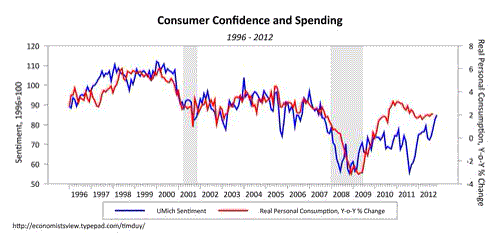I feel as if every December I need to mentally prepare myself for the onslaught of inane media coverage of the holiday shopping season. This year, however, we seem to have a few more voices of reason and common sense. Barry Ritholtz, a long-time veteran of the Black Friday Media Wars, sees signs of hope:
Over the years, I have been rather annoyed (perhaps too much) at the annual foolishness over Black Friday forecasts. Each year, we hear breathless predictions of ridiculous increases in consumer spending — holiday shopping rises 16% this season! — which turn out to be wildly over-optimistic, and are never confirmed by the actual data….
….This year, the idea seems to have spread into the mainstream: Lots of coverage about it, with a few choice quotes from you know who tossed in for good measure.
Ritholtz provides a host of links on the subject, but a recent entrant is missing. Neil Irwin at the Washington Post delivers the truth about Black Friday:
Black Friday is here, and if you happen to derive pleasure from streaming around big box stores or mega malls as part of a teeming horde, well, who am I to judge another person’s sources of enjoyment.
Let’s just not pretend that it means anything…
…sales over Thanksgiving weekend tell us virtually nothing about retail sales for the full holiday season—let alone anything meaningful about the economy as a whole.
So if it is a meaningless event from an economic perspective, what explains the media obsession?
For the media, it is a ready-made story. It takes place at a time that there is little other news, and it is known in advance, so editors and TV news directors can plan in advance for coverage. And there’s no doubt that video of people stampeding through the doors of a Wal-Mart in hot pursuit of a new Wii makes for great television. That is even putting aside more cynical possibilities, such as that media depend on retail advertising and thus have a vested interest in creating a sense of hype and anticipation around an orgy of consumerism.
Nothing more than another media manufactured trend. Bookmark the Irwin piece and refer back to it each morning before you get sucked into the inevitable Bloomberg stories detailing the ups and downs of the holiday season. And remember that everyone will be looking for a quick sound bite to leverage off the holiday mania. Sarah Kliff includes one such bite in a piece on the latest Reuters/Michigan Consumer Sentiment numbers:
…the latest round of economic indicators suggest that economic gloom is finally starting to set in with the general public, and the austerity crisis may have something to do with it. The Reuters/University of Michigan Consumer Sentiment Index fell 2.2 points from the preliminary reading early in November to the final reading after the election…They’re still more optimistic about the current state of the economy, but consumers have become more pessimistic about what’s ahead—a change that IHS Global Insight chalks up to “increased awareness by many Americans of the fiscal cliff.”
“If the political rhetoric and finger pointing reaches a fever pitch similar to that of the debt ceiling crisis in the summer of 2011 then consumer confidence is likely to take a very serious hit, and this holiday season will not be very cheerful,” the IHS analysis concludes.
Aside from the pointlessness of attempting to gain deep understanding about the economy from a minor blip in the confidence numbers, before you start huddling in the corner for fear of imminent economic collapse, please refer back to last summer’s dive in confidence numbers:

While the budget talks did undermine confidence last summer, the impact on spending was essentially nil. I doubt very much that US households will focus much on the fiscal cliff until the new year, choosing instead to focus on holiday parties, egg nog, and gift giving. And if they do give some thought to the cliff, they won’t change their spending measurably; they have already set their budgets for the year. That will only happen if going over the fiscal cliff undermines the job market, something that would not be evident until much deeper into 2013. For now, consumer sentiment is only catching back up to where we would expect it to be given the pace of spending. Nothing more, nothing less. For economic trends more relevant to the path of spending, see Neil Irwin’s reasons to be thankful this season.
Bottom Line: Black Friday hype – just say no.



Leave a Reply